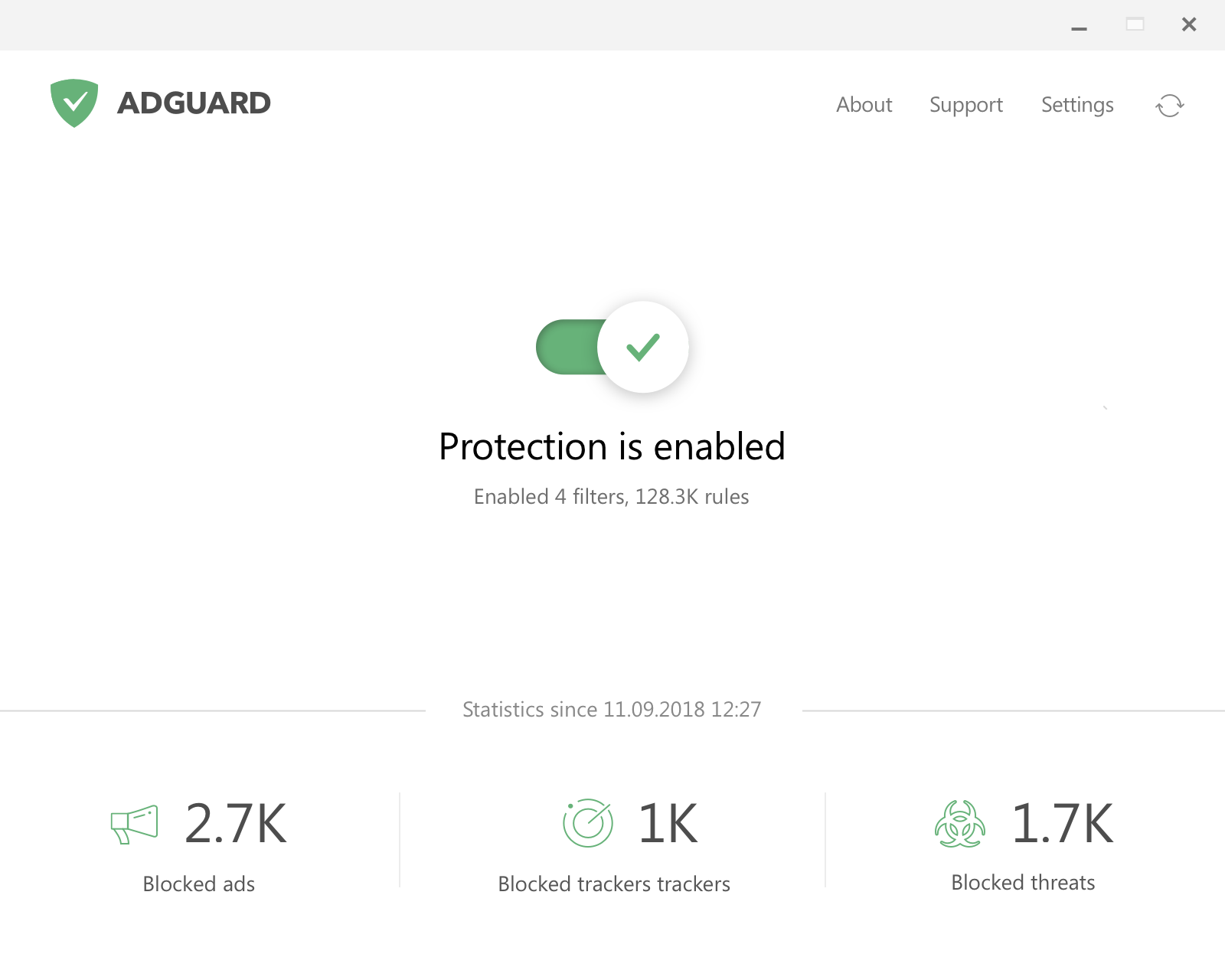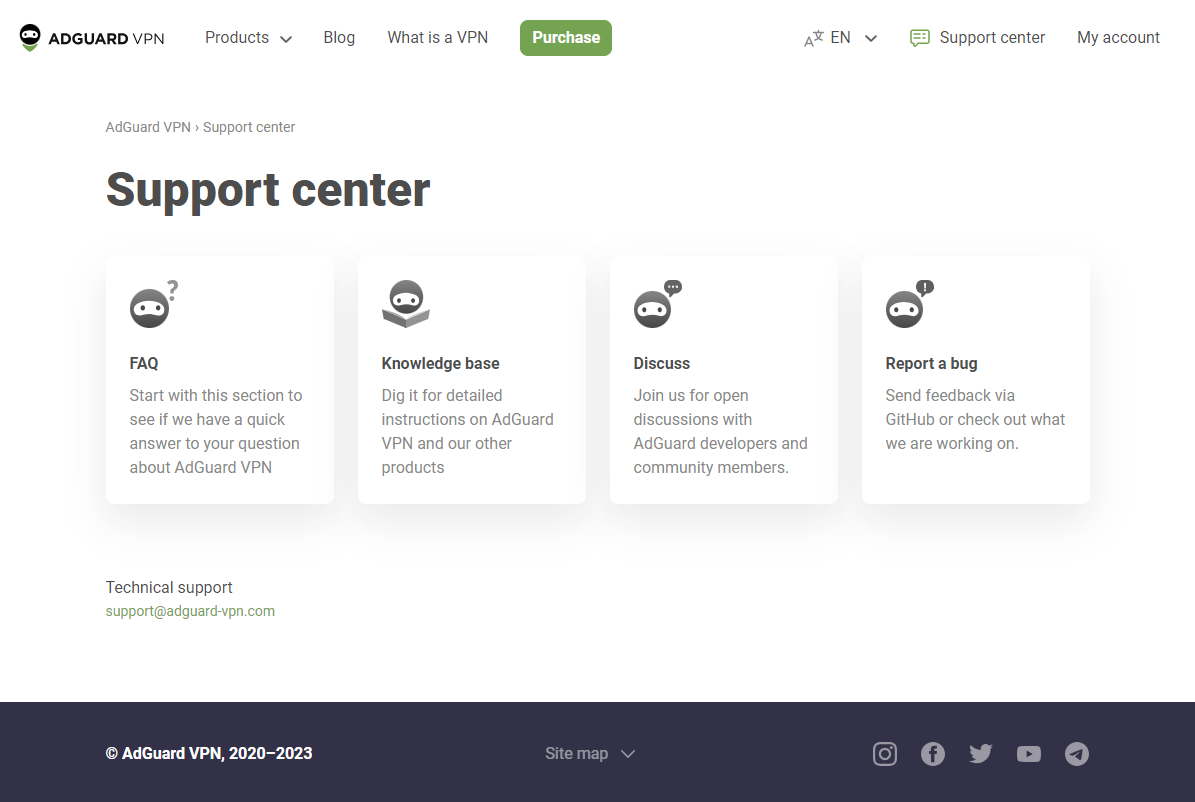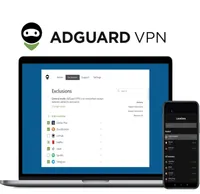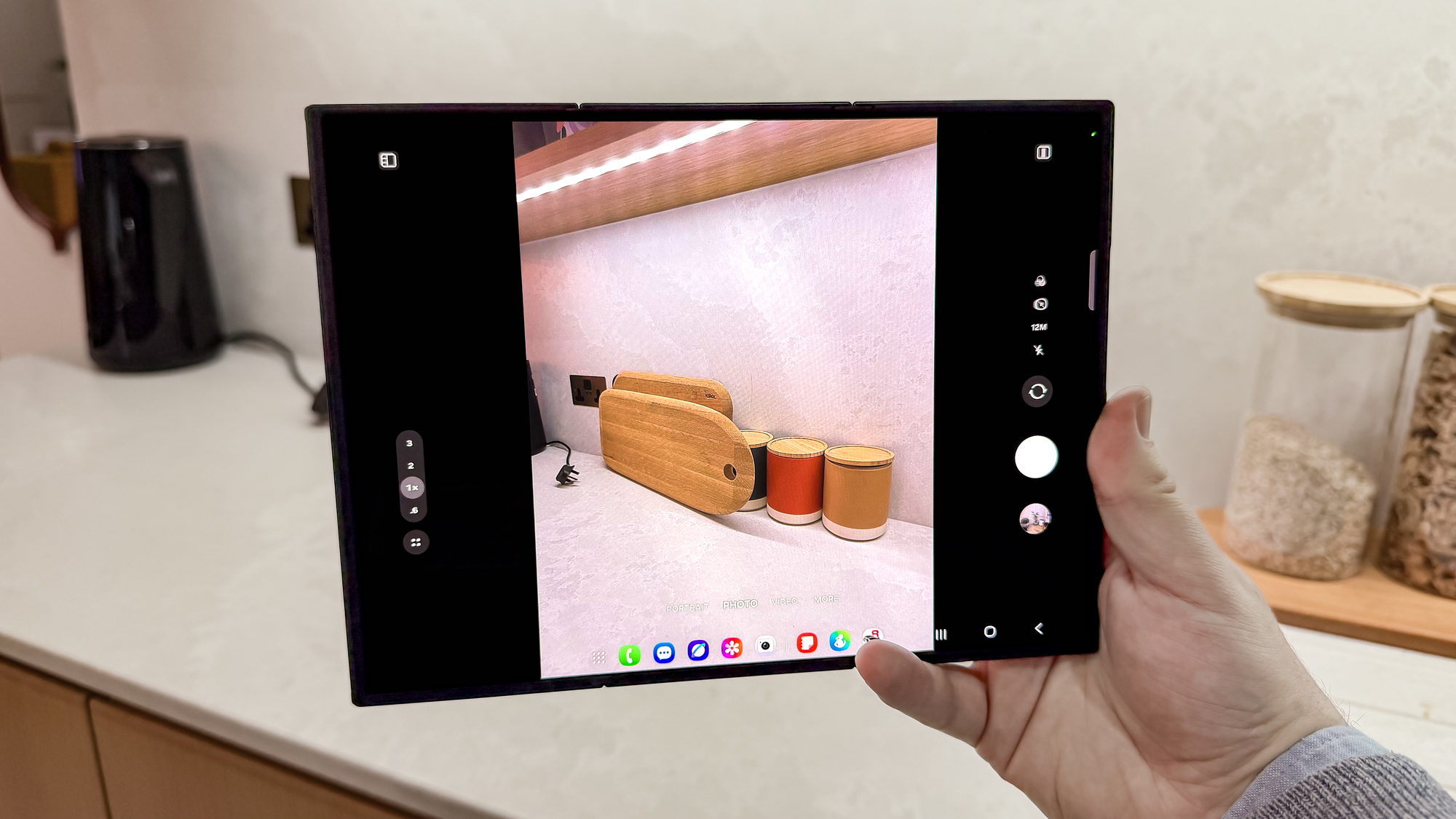Tom's Guide Verdict
AdGuard VPN isn't a show-stopper, due to a questionable privacy policy and poor unblocking results, but it has a few perks that could make it worth trying. You'll get a reliable performance, a good range of server locations, and apps for virtually all devices. Paired with AdGuard Ad Blocker, AdGuard VPN does a solid job of securing your day-to-day browsing – but there are much better options on the market.
Pros
- +
Decent speeds
- +
Unblocks some streaming services
- +
Servers in 65 locations
Cons
- -
No audit, and closed-source software
- -
Uses a proprietary VPN protocol
- -
Privacy policy is concerning
- -
Free plan comes with a bandwidth cap
Why you can trust Tom's Guide
AdGuard has made waves in the world of cybersecurity for a while now thanks to its ad-blocking software, but its integrated AdGuard VPN shouldn't fly under the radar.
Both products are provided by AdGuard Software Limited. The company has its headquarters in Cyprus – a country that complies with GDPR and is a member of the EU. The good news is that Cyprus isn't a part of any intelligence-sharing pacts (like the 14 Eyes) as far as we're aware.
However, things get more complicated when you consider that AdGuard was initially created in 2009 by a team of Russian developers in Moscow. There are some lingering surveillance concerns, but AdGuard has allayed the majority by stating that most of its team works out of the Cyprus offices these days, and that the company doesn't host data in Russia or on Russian-owned servers. AdGuard VPN is upfront and honest about its origins; this transparency is refreshing and ultimately helps potential users reach their own conclusions.
On a more practical level, AdGuard has some handy privacy-enhancing features, a generous network of servers, and easy-to-use apps for just about all devices and browsers. The service isn't without its quirks and concerns, however, and I'll dig into them later in this hands-on AdGuard VPN review.
I'll also take a deeper dive into AdGuard VPN's security, pricing, and whether it stacks up when compared to the very best VPN services of 2026 – and its ad-blocking counterpart.
AdGuard VPN on paper
| Feature | Details |
|---|---|
| Server countries | 53 |
| Supported platforms | Windows, macOS, Android, iOS, Chrome, Edge, Opera |
| Simultaneous connections | 10 |
| Split tunnelling | Yes |
| Kill switch | Yes |
| Protocols supported | AdGuard VPN proprietary protocol |
| Country of registration | Cyprus (formerly Russia) |
| Support | Articles, FAQs, email, ticketing system, community hub |
AdGuard VPN 1-minute review
AdGuard VPN is available for $11.99 a month, and that's not a budget price by any means. It is typical of a rolling monthly VPN subscription, however, and you can save some cash by committing for longer. The one-year plan averages out to $3.99 per month while the two-year plan clocks in at a pretty decent $2.99 per month.
Alternatively, you can check out AdGuard's free plan. You'll get 3 GB of data that'll come in handy in a pinch, although it's better to treat this free subscription as a temporary solution when you really need access to the internet via a VPN. Plus, the 20 Mbps connection cap can be frustrating if you're trying to jump onto video calls or stream your favorite shows.
On that note, AdGuard VPN didn't blow me away with its unblocking ability. The VPN can access Netflix, BBC iPlayer, and Disney+ from the US, but it couldn't stream Peacock or Amazon Prime. When I switched to UK servers, I couldn't access ITV or 4OD, either. I'd ultimately recommend checking out another top streaming VPN, but when AdGuard did unblock a service, it provided a buffer-free, high-quality streaming experience.
AdGuard's privacy measures are slightly concerning, too. The service doesn't use tried-and-tested protocols like OpenVPN and WireGuard, and instead uses its own custom proprietary protocol. If this has you raising an eyebrow, you're not alone – and a lack of a third-party audit, and closed-source apps, are just as worrying.
AdGuard VPN's server network spans an impressive 65 locations in 53 countries
Unfortunately, I also noticed DNS leaks during testing, which means AdGuard isn't a viable torrenting VPN. Some users will also want a clearer picture of the service's connection to Russia. I couldn't find evidence of it connecting to Russian addresses during my testing, but that doesn't mean the links aren't there.
When it comes to speed, AdGuard VPN performed fairly well. Tested on my 100 Mbps connection, it delivered an average download speed of 58.73 Mbps and upload speed of 23.18 Mbps. This is slower than the likes of ExpressVPN and NordVPN, but you'll still have no trouble streaming HD content across multiple devices, which is good news if you plan to share the ten simultaneous connections across your household.
AdGuard VPN's server coverage is pretty generous, too. You'll be able to connect to over 65 locations in 53 countries, ranging across Europe, the Middle East, the Americas, Asia, and Africa. For anyone looking to access content from overseas (or catch up on what's happening at home when traveling abroad), this global network is a big win.
AdGuard VPN has all the necessary building blocks to be a sturdy, reliable option, but there's still plenty of room for improvement. If the service introduced secure, vetted protocols, improved its unblocking power, and addressed the DNS leaks, it'd make a world of difference. For now, AdGuard VPN is a middling provider that's probably best suited to users already making use of AdGuard Ad Blocker to round out their privacy package.
AdGuard VPN price and payment
Boost your digital security, access 53 international servers, and try AdGuard VPN for yourself today!
For $11.99 a month, you can enjoy all of AdGuard's premium features—including a kill switch and access to US Netflix—as well as a 30-day money-back guarantee.
A 1-year plan is also available at $3.99 a month, and a 2-year plan at$2.99 a month. Both long-term plans bag you up to 24 months of protection and major savings.
There are two AdGuard VPN subscriptions available: a free plan and a more feature-rich paid alternative. The free plan bags you 3 Gb of data per month and a 20 Mbps connection cap. That's not unusual for a free subscription, although other providers tend to be more generous. Even so, AdGuard VPN's free plan is useful if you need inexpensive and temporary access to a VPN. What really impressed me is that free users can connect to ten server locations. ProtonVPN, in comparison, offers an unlimited free VPN but only three server locations.
At $11.99 per month, AdGuard VPN's monthly paid plan is on the pricey side. Some of the industry's biggest names, like ExpressVPN, charge a similar amount, but you'll get a lot more in return—like more handy features, access to a wider variety of streaming platforms, and reassurance in the form of a third-party audit.
As is usually the case with VPNs, discounts begin to stack up the longer the subscription is. So, if you're on the hunt for a bargain and don't mind a bit of commitment, you can save some money by choosing a long-term plan.
The one-year subscription is particularly reasonable at $3.99 a month, and the price gets even better, at $2.99, when you opt for the two-year plan. All of AdGuard VPN's paid plans support ten simultaneous connections, too, which should be more than enough to keep all of your devices secure, but it might be a stretch if you're hoping to cover an entire household of internet-enabled gadgets.
Once you decide to take the plunge, you can pay for your subscription with any major credit or debit card, via PayPal, or even with cryptocurrencies (including Bitcoin, Ethereum, Litecoin, and Tether). This blend of accepted payment methods means that you can roll with whatever's most convenient or opt for more anonymity—the choice is yours.
Finally, it's worth noting that both of AdGuard's paid plans come with a 30-day money-back guarantee. So, you'll be able to reclaim your money if you're not totally impressed with the service, get a full month to put it to the test, and get a much better sense of AdGuard's apps and values this way than by using its free plan.
▶ Sign up now on the AdGuard website
How private and secure is AdGuard?
Check out any of the major players across the VPN landscape and you'll see that their clients are built on top of reliable VPN protocols. OpenVPN, WireGuard, IPSec, and more—they're well-known and, more importantly, thoroughly audited. AdGuard bucks this trend by using a custom-built proprietary protocol with some important differences.
The AdGuard VPN protocol doesn't use a traditional VPN tunnel, and instead secures your data within an encrypted HTTPS connection. This is similar to how Shadowsocks does things, although the difference is that while Shadowsocks prioritizes obfuscation, AdGuard VPN's protocol uses HTTPS to improve its overall speed as it cuts down on the essential overhead it takes to run a VPN connection.
As you might expect, this has some less-than-stellar security implications. AdGuard VPN isn't open source, which makes it difficult to check whether its protocol is implemented correctly without vulnerabilities and backdoors. These are concerns you just don't get with OpenVPN and WireGuard, seeing as they've been carefully vetted for weaknesses that could compromise your digital privacy.
On that note, AdGuard VPN also hasn't undergone a third-party audit. Audits are a great way to see which providers take their commitment to security seriously. Without one, it's almost impossible to place your trust in a provider entirely—and just as difficult to see whether AdGuard VPN's protocol and no-logs promise are legitimate.
AdGuard VPN isn't open source, which makes it difficult to check whether its proprietary protocol is implemented correctly.
There is some good news, however. The service uses sturdy AES-256 encryption to keep your browsing sessions secure, which is just what I like to see. So, while AdGuard VPN isn't the most secure VPN out there, its encryption will certainly come in handy if you're using public Wi-Fi hotspots and want to avoid falling prey to snoopers and opportunistic cybercriminals. Additionally, the kill-switch will cut your internet access to prevent leaks if your VPN connection drops for any reason.
I was also glad to see that AdGuard VPN has its own split tunneling functionality. The feature allows users to dictate which websites use the VPN tunnel and which don't—for example, you could tell AdGuard VPN to activate whenever you access Netflix in order to view a particular international library of content.
How fast is AdGuard VPN?
| Protocol | Speed result |
|---|---|
| AdGuard VPN proprietary protocol | 58.73 Mbps |
AdGuard VPN's speeds are nothing to write home about, though you can expect a decent performance if you're subscribed to a paid plan. I used a 100 Mbps connection and Ookla's speedtest suite to get a clearer picture of just how quick the service is. Currently, AdGuard VPN records an average 58.73 Mbps download speed and 23.18 Mbps upload speed.
It's a different story for free users, however. I discovered that AdGuard really does stick to its advertised 20 Mbps cap – so don't expect any wiggle room.
All in all, AdGuard VPN's performance is below par. For less money a month, you could check out a service like Surfshark that's far faster (with WireGuard), is stuffed with features, and boasts fully audited servers.
AdGuard VPN just doesn't have the speed you need for data-intensive tasks like online gaming or streaming across multiple devices simultaneously without hiccups. AdGuard is a less-than-ideal torrenting VPN, too, thanks to DNS leaks on mobile devices that allow your ISP to keep tabs on your activity.
How good is AdGuard VPN for streaming?
| Service | Test results |
|---|---|
| Netflix | Working (US) |
| Prime | Unavailable |
| iPlayer | Working |
| Disney Plus | Working |
| ITV Player | Unavailable |
| All4 | Unavailable |
AdGuard VPN is no slouch when it comes to streaming, and I was pleasantly surprised by how many big-name services it was able to unblock. Even the top providers can struggle to access the likes of Netflix, BBC iPlayer, and Disney+, but AdGuard VPN had no trouble with these services when I was connected to a US server. What's more, the VPN also accessed HBO Max and Hulu.
Things weren't as rosy when I tried streaming Peacock, however. Despite my best efforts, I couldn't access anything under the Peacock umbrella (including WWE programming) or Amazon Prime. This was a surprise, especially after AdGuard VPN's performance as a Netflix VPN, and most VPN providers work with Amazon Prime easily enough.
Switching to UK servers was another mixed bag. BBC iPlayer VPN performance was great, but I had no luck accessing ITV and 4OD.
These hit-and-miss results had me wondering why AdGuard puts so much stock in its proprietary protocol if a long list of major streaming services still block the VPN. It is worth mentioning, however, that when I did access a stream with AdGuard VPN, the connection was always fantastic. I didn't have to wait ages for shows to buffer, the quality was perfect (even when I tried 4K shows on Netflix), and I sometimes forgot that the VPN was switched on.
If you're on the hunt for a VPN to use primarily while streaming, AdGuard VPN might not be your match made in heaven. Too many streaming services recognize it, although it works well when this isn't an issue. For reliable access to a much broader selection of shows and apps, whether you're abroad or at home, I'd suggest checking out ExpressVPN, instead.
How good are AdGuard VPN's apps?
AdGuard VPN currently offers Windows VPN, Mac VPN, Android VPN, and iOS VPN apps. Currently, there's no Linux VPN support, and no OpenVPN config, which means you won't be able to load the service onto a router, SmartTV, or IoT device. The VPN makes up for this, somewhat, with a range of browser extensions for Chrome, Firefox, Edge, and Opera.
I was also glad to see that the AdGuard Ad Blocker is compatible with AdGuard VPN. It's a well-regarded solution that keeps malicious ads, malware, and trackers at bay, and compliments the VPN nicely. That being said, industry-leading VPNs usually have their own ad-blockers built into their apps, working at the DNS level to prevent all sorts of nasties, like ads and malware, from being downloaded onto your device. AdGuard Ad Blocker doesn't have this same DNS-level blocking which, unfortunately, means it's not quite as efficient.
At first glance, the Windows and Mac clients are secure, but digging deeper revealed a number of DNS leaks when I ran them in integrated mode alongside the ad-blocking AdGuard solution. Simply put, this means that your ISP will see the requests you make when you use AdGuard – and that's a major breach of your digital privacy.
Finally, let's address the elephant in the room: AdGuard VPN potentially hosting data in Russia or on Russian servers. I couldn't find any evidence of the VPN connecting to Russian addresses during my testing, although it's entirely possible that AdGuard does this internally when it captures data from its servers. For now, there are no blatant data trails from your machine, but privacy purists will no doubt be put off by the mere thought of any connection with Russia.

How good is AdGuard VPN's support?
You can reach out to AdGuard VPN by email, ticketing system, or via Telegram for more direct support. I sent the team an email and received a reply the very same day that helped tackle my technical query about the proprietary protocol. What's more, the response was easy to follow and clearly written by knowledgeable staff – so full marks there. The Telegram channel also provides speedy responses on issues ranging from setup to billing. If you have a more complex conundrum, your best bet is the ticketing system.
In addition to direct support channels, AdGuard VPN's active community is made up of users that more than happy to help troubleshoot technical issues. In fact, you're often better off reaching out to these users than combing through the official FAQ. It's pretty hard to navigate and can lead you to an answer that doesn't address your question. The knowledgebase is more thorough and useful, but still falls short of advice from the AdGuard VPN team and its users.

Should you buy AdGuard VPN?
AdGuard VPN is mid-pack at best – it's not our number one pick but it's not totally unusable. If you already have AdGuard Ad Blocker, it could be worth picking up the VPN to flesh out your digital security with solid encryption, a kill switch, and split tunneling. Bear in mind that some VPNs, like NordVPN and Surfshark, can block ads even more effectively than AdGuard VPN thanks to DNS-level blocking and blacklists. These providers (and plenty of others) also offer more in terms of features, streaming capability, and protocols – and also don't suffer the same DNS leaks I noticed.
There are more comprehensive free VPNs out there, too – like Proton VPN and Windscribe – that give users more monthly bandwidth. Linux users will have to look elsewhere for a VPN with a compatible client (and you can't go wrong with Private Internet Access).
Ultimately, if you want a service that combines all of the features listed above, in addition to some of the best security measures and tools available, then you'll want to try a VPN that's been leading the industry for years – like ExpressVPN.
Tom's Guide rating: ⭐⭐½
Subscribe if:
✔️ You want a fairly priced long-term subscription. AdGuard VPN's 1-year and 2-year subscriptions only cost a few dollars a month, so you can grab a bargain and enjoy access to some solid security features.
✔️ You need free access to a VPN. Whether you're putting the service to the test or need a quick, cost-effective, and secure connection to ten international locations, AdGuard has you covered.
Don't subscribe if:
❌ You want to use OpenVPN and WireGuard protocols. AdGuard VPN’s proprietary protocol is something of a mystery, and the lack of an audit makes it difficult to say whether it's totally secure.
❌ You need rock-solid privacy. While AdGuard VPN mostly covers the basics, the DNS leaks I found are worrisome to say the least.
❌ You need the fastest VPN on the market. Simply put, there are quicker (and cheaper) providers out there that are better suited to torrenting, gaming, and multi-device streaming.
| Feature | Comments | Rating |
|---|---|---|
| Design | Simple, clean, and no unnecessary clutter in sight | ⭐⭐⭐⭐ |
| Ease of use | All apps, across all devices, are incredibly easy to use – even for VPN newbies | ⭐⭐⭐⭐⭐ |
| Performance | Passable speeds, but not the fastest provider on the block by a wide margin | ⭐⭐ |
| Unblocking | Provides access to Netflix, BBC iPlayer, and Disney+, but couldn't unblock Amazon Prime | ⭐⭐⭐ |
| Security and privacy | DNS leaks, the lack of OpenVPN and WireGuard protocols, and third-party audits, will be a red flag for some | ⭐⭐ |
| Customer support | No live chat, but you can reach out via email, ticketing system, or Telegram | ⭐⭐ |
| Price | While not the cheapest month-on-month, the long-term subscriptions offer real value for money | ⭐⭐⭐ |
How we test VPNs
Understanding how our team of experts tests VPNs is important. It lets you know that we really have got hands-on with these products, and that we’ve considered every feature, no matter how small. Some sites just give a rundown of specs found on a provider’s website – we endeavor to do quite a bit more than that.
First of all, we do check the provider websites, and note useful information like the number of servers and locations, whether you’re allowed to use every server for P2P, which encryption protocols are supported, the variety of operating systems it runs on, and tons more. We also check the pricing at this stage.
This initial scan gives us a baseline understanding of the service, and if there are any bold claims on-site we note them to make sure the customer isn’t being misled.
We’ll then dig into privacy policies. This is a very important piece of literature for any company, but for VPNs they need to be absolutely watertight. We’ll also go through the logging or zero-logging policy to look for gaps, and read any information available on independent audits.
Then it comes to testing the applications themselves. We test how easy it is to download and install, noting if any data collection options are clearly outlined to the user. We then inspect the default configuration to see what you have to ‘opt in’ for, and what features are available overall. We then play around with any additional features, such as ExpressVPN’s server speed test or NordVPN’s Double VPN. After we’ve gone through everything on the surface, the fun bit starts – trying to break things.
We throw all sorts of curveballs at these VPNs, like connecting to oddly configured networks, and killing processes to see if we can get the VPN to stop without activating the kill switch.
After we’ve had our fun, we check in with the support team to see if they’re helpful. Then, we’ll check a wide range of streaming sites to see if the VPN is able to access geo-blocked content, and we’ll run a series of speed tests over a few days and nights to get an accurate picture of what sort of connection speeds you can expect.


River is a Tech Software Editor and VPN expert, helping take care of cybersecurity content on Tom's Guide, ranging from reviews, buying guides, and must-have VPN deals. River's expertise in the cybersecurity field opened their eyes to the startling amount of online snooping we accept into our daily lives. Now, River is committed to fighting for your right to digital privacy by shining a light on its biggest threats – and helping readers safeguard their data with the help of a VPN. Surfshark is River's favorite VPN, and they use it every day to keep their most sensitive details out of the hands of third-party trackers.
- Mike Williams
- Mo Harber-LamondVPN Editor







